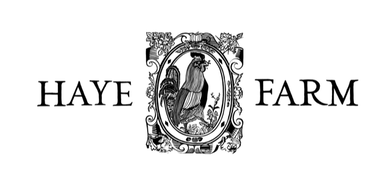SHEEP
We keep a flock of around 200 Exlana ewes, a relatively new breed that has been developed for their ease of management (they shed their own wool for example) and for their resistance to many of the common diseases to which sheep are so prone. This makes them the perfect choice for an organic system in which we want to minimise any pharmaceutical interventions.
They thrive on our unsprayed pasture, feeding on the native grasses, clover, plantain, sorrel and other herbs that grow there. As with all our animals, we mob graze them quite tightly to keep the ecosystem diverse and flourishing. Give sheep too much space and they’ll eat only the plants they like – the wildflowers and the clover – which means the plants they don’t like get more chance to grow and establish, reducing biodiversity. But by putting them in a relatively small area and moving them daily, they’ll eat everything, and it will all be able to regenerate at the same speed.
Unlike our cattle, which come into the barn in winter, our sheep stay outside for 365 days a year, lambing in the open just as they do in nature. Lambs are born in April and stay with their mothers for four months and we grow them on for another few months after that, giving them time to feed up on our fresh, sweet grass and allowing their muscles and therefore their meat to develop texture and a deep, savoury flavour.
They thrive on our unsprayed pasture, feeding on the native grasses, clover, plantain, sorrel and other herbs that grow there. As with all our animals, we mob graze them quite tightly to keep the ecosystem diverse and flourishing. Give sheep too much space and they’ll eat only the plants they like – the wildflowers and the clover – which means the plants they don’t like get more chance to grow and establish, reducing biodiversity. But by putting them in a relatively small area and moving them daily, they’ll eat everything, and it will all be able to regenerate at the same speed.
Unlike our cattle, which come into the barn in winter, our sheep stay outside for 365 days a year, lambing in the open just as they do in nature. Lambs are born in April and stay with their mothers for four months and we grow them on for another few months after that, giving them time to feed up on our fresh, sweet grass and allowing their muscles and therefore their meat to develop texture and a deep, savoury flavour.
